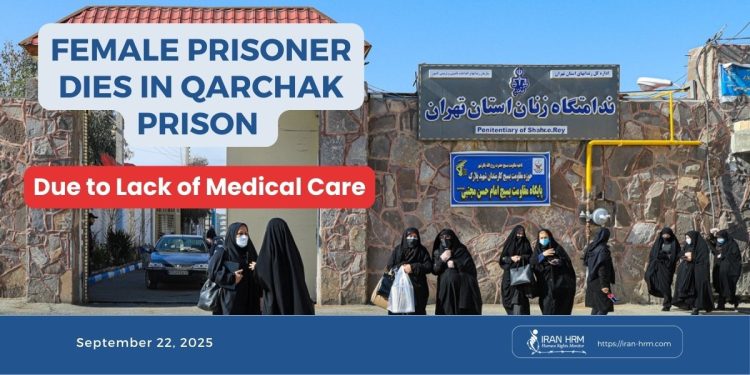On Friday, September 19, 2025, a female prisoner, Jamileh Azizi, died in Qarchak Prison in Varamin. According to informed sources, the cause of death was a lack of urgent medical attention despite clear signs of a medical emergency. Azizi, who had shown symptoms of a heart attack, was taken to the prison infirmary. However, after a brief examination, medical staff dismissed her condition and instructed that she be returned to her ward. She died shortly after returning to Ward.
Chronic Medical Neglect in Qarchak Prison
Qarchak Prison, located southeast of Tehran, has long been notorious for its overcrowding and severe lack of medical facilities, particularly for women. Human rights sources report that delays in medical treatment are routine, and prisoners suffering from serious health conditions are frequently denied timely care. The facility has only one doctor and one medical assistant responsible for over 4,000 inmates, a situation that has led to dangerous and often deadly neglect.
Prisoners are often forced to submit repeated requests to receive even basic medical services. In urgent cases, transfers to outside hospitals are frequently delayed or denied altogether. The death of Jamileh Azizi is not an isolated incident but part of a broader pattern of systemic neglect in Iran’s prison system.
Rising Death Toll from Medical Negligence
Human rights organizations have repeatedly raised alarms over the growing number of prisoner deaths resulting from lack of access to healthcare. At least 20 prisoners are reported to have died in Iran’s prisons over the past year due to preventable medical complications. These deaths have been attributed to the shortage of essential medications, lack of basic equipment, and delays in diagnosis and treatment.
Jamileh Azizi’s death illustrates this widespread crisis. Despite presenting symptoms of a life-threatening condition, her pleas for help were ignored — ultimately resulting in her death.
Deteriorating Sanitary Conditions
Beyond the medical crisis, Qarchak Prison also suffers from extremely poor sanitary conditions. Inmates face contaminated facilities, overcrowding, a lack of disinfectants, and virtually no access to basic hygiene — conditions that have led to outbreaks of infectious diseases. These health risks disproportionately affect women, who are often detained in environments that fail to meet even minimal health standards.
Human rights experts warn that the continuation of these conditions will likely result in further deaths and underscore the urgent need for independent oversight and the improvement of prison healthcare infrastructure.







